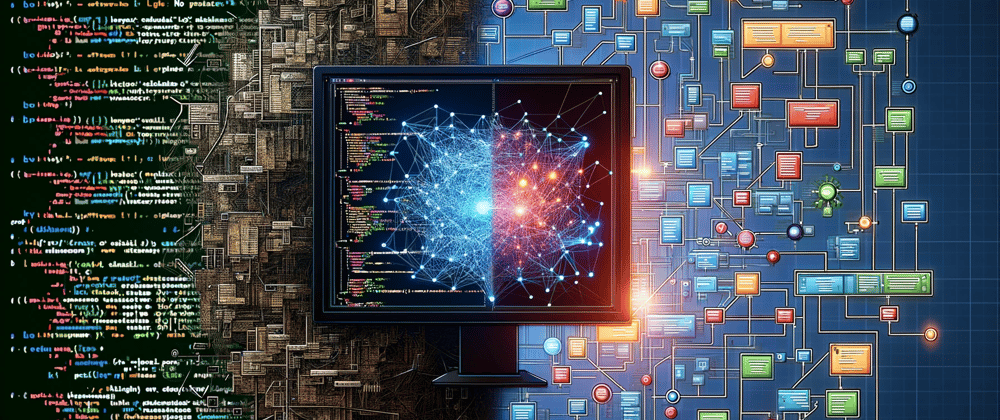I originally started writing this post at the end of 2022 but never finished it. Originally titled "Why LowCode/NoCode both excites and terrifies me!", with the buzz around ChatGPT over the last months, I decided to 1) finish the post, and 2) update it to include AI tools like CoPilot and ChatGPT. So here, finally, is the update. Also a little different to my usual style. I didn't like it.
As the world of technology evolves at breakneck speed, buzzwords like AI, No Code, and Low Code have taken the stage. These powerful tools and frameworks promise to revolutionise how software is built, with some even claiming they'll replace the need for junior and mid-level developers. But is this really the case, or is it just another wave of hype? Today, we're going to debunk the myth that these solutions will make developers obsolete, and explore how the need for experienced professionals will only continue to grow.
From Hackers to Stack Overflow: The Evolution of Technical Competency
Before we dive into the topic at hand, let's take a quick trip down memory lane. The hacker generation of the 80s was characterised by a deep understanding of the inner workings of computers and systems. However, as technology became more accessible, it seems we've experienced a decline in technical competency. The modern developer now has resources like Google and Stack Overflow to rely on, making it easier to find solutions without truly understanding the underlying concepts.
This phenomenon can be demonstrated by the resurgence of interest in older, low-level programming languages. According to a 2019 Stack Overflow survey, languages like C and Assembly experienced a slight uptick in popularity compared to previous years. This indicates that as technology continues to advance, there's still a demand for individuals who possess a deep understanding of the fundamentals.
AI, No Code, and Low Code: Powerful Tools, But Not a Replacement
There's no denying that these tools and platforms have made software development more accessible. By automating repetitive tasks and simplifying complex processes, these tools have empowered non-technical individuals to create apps, websites, and other digital products. However, this newfound ease of use shouldn't be mistaken for a replacement of skilled developers.
The truth is, AI and other automation tools are only as good as the data they're trained on and the algorithms they utilise. When it comes to creating reliable, secure, and efficient software, there's no substitute for the expertise of an experienced developer. From debugging code to optimising performance, a human touch is still essential for producing high-quality software.
Anecdotes: Why Experience Matters
Imagine a scenario where an individual with no programming experience creates an app using a No Code platform. While the app may function on the surface, it could be riddled with security vulnerabilities and performance issues. This is where experienced developers come into play – they can identify these problems and implement proper fixes, ensuring the app meets industry standards.
Moreover, AI platforms, and especially No Code and Low Code frameworks, are limited by their own design. When a project requires customisation or complex functionality, the limitations of these platforms become apparent. In these cases, developers with a deep understanding of programming languages, frameworks, and software design principles are crucial for success.
The Limits of AI, No Code, and Low Code: Creativity and Truly Unique Problems
Expanding on the idea that these tools are limited by their own design, it's essential to consider the impact of creativity and the ability to tackle truly unique problems. Until we have Artificial General Intelligence (AGI) – AI that can perform any intellectual task that a human can – these tools will always face limitations when it comes to addressing novel challenges.
In many cases, particularly with startups, the problems being tackled are unique and don't have pre-existing, directly related solutions. AI, No Code, and Low Code tools rely on existing data and previous problem-solving examples to operate efficiently. When confronted with an unprecedented issue, these platforms often struggle to provide the necessary creative solutions.
This is where the ingenuity and expertise of human developers become invaluable. Developers can think outside the box, generate innovative solutions, and adapt to new situations. Until AGI becomes a reality, the creativity and problem-solving capabilities of human developers will remain a crucial component in addressing truly unique challenges. Thus, the limitations of these tools only serve to emphasize the continued importance of experienced developers in the world of software development.
Building a New Generation of Hackers: The Importance of Mentorship and Skill Development
As we embrace the power of AI, No Code, and Low Code tools, it's vital that experienced developers take on the responsibility of training and mentoring junior and mid-level developers to become self-sufficient and avoid overreliance on these tools for "quick wins." While these platforms can certainly streamline certain aspects of the development process, fostering a new generation of "hackers" with deep technical knowledge and creative problem-solving skills is crucial for the future of software development.
The potential loss of skills and creativity due to an overreliance on automated tools is a genuine concern. By encouraging junior and mid-level developers to master programming languages, software design principles, and problem-solving techniques, experienced developers can help preserve and cultivate the ingenuity that has driven the tech industry forward for decades.
Mentorship and hands-on learning experiences should be an integral part of a developer's growth. This not only ensures that new developers possess the necessary skills to tackle complex challenges but also fosters a culture of innovation and continuous improvement. By investing in the development of the next generation of hackers, we can ensure that the software industry remains dynamic, creative, and capable of pushing the boundaries of what's possible.
The Bottom Line: The Future of Development Lies in Collaboration
Rather than making developers obsolete, these tools and frameworks will continue to complement their skill sets. These platforms empower developers to focus on more complex tasks, allowing them to deliver better software solutions more efficiently. As technology advances, we'll undoubtedly see more powerful tools emerge, but the need for experienced developers will remain constant. And I firmly believe these developers will be the ones to develop the tools that might eventually really end up replacing some jobs. But not yet.
The future of software development lies in the collaboration between humans and machines. By leveraging the strengths of both, we can create a world where technology is more accessible, efficient, and secure than ever before. So, let's debunk the myth once and for all: AI, No Code, and Low Code won't replace junior and mid-level devs – they'll simply transform the way we work together.







Oldest comments (0)